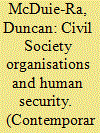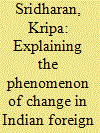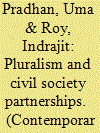|
|
|
Sort Order |
|
|
|
Items / Page
|
|
|
|
|
|
|
| Srl | Item |
| 1 |
ID:
075239


|
|
|
|
|
| Publication |
2006.
|
| Summary/Abstract |
This paper examines the limitations on civil society organisations (CSOs) in India's Northeast, specifically the state of Meghalaya, and suggests some strategies they must pursue to overcome them. The majority of literature concerning the Northeast tends to focus on national security, insurgency and violence, with a limited analysis of the role of CSOs and the human security of people living in these circumstances. CSOs in the Northeast face restrictions from above by the central government and the military, and from below by insurgent organisations and ethno-nationalist movements; in other words, by civil society itself. While the struggle for autonomy and rights in the Northeast looks set to continue, the effectiveness of CSOs is being further jeopardised as they are caught between these more powerful actors. The functioning of CSOs is being curtailed, and the lives and needs of people living between these poles are being neglected. Using Meghalaya as an example, this paper discusses the consequences for human security and the limitations faced by CSOs operating in the region. The paper argues that, in order to more effectively empower the people in the region, CSOs need to transcend co-optation from above and below, and focus on local human security issues rather than nationalist or ethno-nationalist agendas.
|
|
|
|
|
|
|
|
|
|
|
|
|
|
|
|
| 2 |
ID:
075244


|
|
|
|
|
| Publication |
2006.
|
| Summary/Abstract |
This paper seeks to explain the conditions under which governments decide to change the course of their foreign policy using the National Democratic Alliance regime of India as a case study. The foreign policy change literature is rich in insights about the sources, conditions and consequences of change. The relevant findings from the literature are used to analyse the nature and degree of change in Indian foreign policy under the National Democratic Alliance government in two areas: nuclear policy and Indo-US relations. While it is generally conceded that India changed the course and content of its policy in the late 1990s, the reasons and impact of the change are still a matter of debate. There is also no agreement on whether India has just made some adjustment changes or a fundamental shift in its orientation. This paper uses relevant indicators to establish the nature, level and degree of change in India's policy, and examines whether policy alterations were merely reactive, incremental and ad hoc, or whether they represented a conscious design comprising clear objectives and supportive strategies.
|
|
|
|
|
|
|
|
|
|
|
|
|
|
|
|
| 3 |
ID:
075243


|
|
|
|
|
| Publication |
2006.
|
| Summary/Abstract |
Hitherto, South Asian governments have found it convenient to arbitrate between different sections and communities. Increasingly, however, as a multiplicity of demands surface articulating the democratic aspirations of marginalised castes, creeds, tribal peoples and other ethnic groups, governments must work in collaboration with actors in civil society. As monolithically constructed communities are splintered along ‘local’ constituents and development agencies relate rights-based programming with disaggregated data on caste, class and gender, the possibilities for multiculturalism become manifold. Democratic pluralism is key to development. This paper is based on fieldwork in two contiguous regions of South Asia; the Himalayan kingdom of Nepal, and the northern Indian state of Uttar Pradesh. On the one hand, this region has been the hotbed of linguo-religious identity construction and contestation since at least the 1870s, and especially after the 1920s. On the other hand, it has recently been witness to the emergence of strong political movements among hitherto ‘untouchable’ Dalits and landless classes, and the active interest of development agencies. Three broad themes are explored through this paper; the impact of development and markets on Dalit communities, cultures of subjugation and protest among them, and the impact of community-based groups on how they are able to negotiate and contest their disadvantages. The emergence of community-based organisations, especially those formed during the course of the struggle for labour rights, are seen as contributing to democratic pluralism. At the same time, the paper advises caution by emphasising that the formation of community-based organisations is no substitute for political advocacy or technical solutions; rather, they must be grounded in local traditions of protest to be effective.
|
|
|
|
|
|
|
|
|
|
|
|
|
|
|
|
|
|
|
|
|